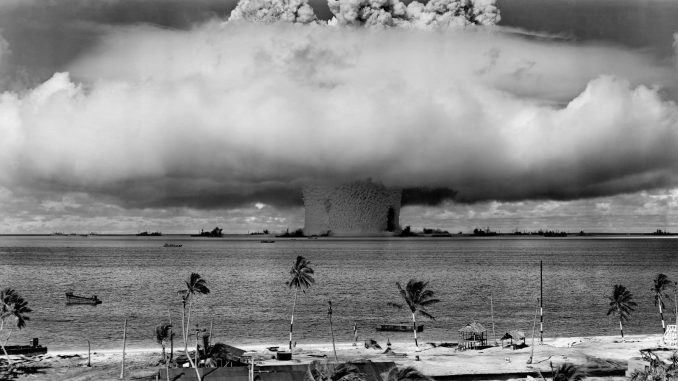
Context:
On Saturday, India’s defence minister Rajnath singh tweeted that India’s no first use policy of nuclear weapons is subject to ‘circumstances’.
What is the ‘No First Use’ Policy?
- The ‘No First Use’ or NFU is a doctrinal policy by a nuclear powered state to refrain itself from using nuclear weapons on its adversary unless it is first attacked by the adversary with a nuclear weapon. It is an authoritative statement which states that nuclear weapons will be used only as a retaliatory measure and not as a primary asaultory measure.
- China is the first country to make ‘No First Use’ pledge in 1964 and has successfully maintained this policy since then. India had adopted this doctrine in 1998 after the successful nuclear testing in 1998. China and India are the only two nuclear powered countries which pledge to this doctrine currently.
India and NFU
- A draft issued by the Indian Government in 1999 asserts that India will use its nuclear arsenal only for retaliation in the case of being first attacked by a nuclear weapon by its adversary. Only the Prime Minister or his ‘designated successor’ is given the power to authorize the use of nuclear weapons.
- India’s nuclear policy is based on the doctrine of ‘Credible minimum deterrence’ which underscores no first use and an assured minimum deterrence capability. The policy establishes India as a responsible nuclear power in the world.
- The policy specifies that India would not use nuclear weapons only against a nuclear powered state. Further, the policy shows India’s commitment to a nuclear weapons free world through global nuclear disarmament.
Historical Background:
- India had adopted the ‘No first Use’ doctrine in 1998 after the successful nuclear testing in 1998 in Pokharan -2.
- In 2003, a slight change in India’s no first use policy was marked by an official nuclear doctrine by Prime Minister’s Office which underlined two contingencies:
India can use nuclear weapon when Indian territory is under a nuclear attack or Indian troops (in or outside Inidan territory) are under attack.
- However, an even more important change was made in the official release which reads as “in the event of a major attack against India, or Indian forces anywhere, by biological or chemical weapons, India will retain the option of retaliating with nuclear weapons”.
The relevance of NFU:
- India’s ‘no first use’ policy serves as a diplomatic tool in portraying India as a responsible country. The policy constructs the image of India in international forums as a ‘moderate’ power which is in sharp contrast with Pakistan.
- India has repeatedly made a strong case in the United Nations by its refusal to join the nuclear arm race and proposing worldwide negotiations on a global indoctrination of no first use.
- The NFU has also prevented an international opprobrium of India’s nuclear decision in various occasions, for example, when a resolution was adopted by the security council to condemn India’s nuclear tests.
- With the repeated attempts by Pakistan to lower the nuclear threshold between the two countries, the NFU policy has been successful in maintaining a high nuclear threshold despite the tensions.
Why should India continue with the NFU policy?
- Abdicating the no first use’ policy will provide Beijing an opportunity to revise China’s own ‘no first use’ policy and to shift blame on India for that. China can excuse itself for adopting a first strike policy against the United States and Russia as well.
- To adopt a first strike policy will badly damage india’s long earned reputation as a responsible state. It could also turn out to be as a provocatory step for Pakistan to make a pre-emptive nuclear strike on India.
Global No First Use (GNFU) Policy:
- Globan No First Use refers to a pledge by all the nuclear powers in the world to restrict the use of nuclear weapons to retaliate in a nuclear aftermath. The pledge is an important component of the country’s nuclear policy.
- The idea of a ‘global no first use’ encourages the goal of worldwide nuclear disarmament.
Conclusion:
- The No First Use has provided a diplomatic edge in various international forums and established India as a ‘responsible’ state. Howerver, despite its success expert stratagist has argued in the favour of abandonment of this policy.
- Although have been conducted many public talks and attempts to advance the NFU, the leaders might not be thinking and planning a complete adherence to the policy.
- The rising tensions on the military front require India to be able to launch first nuclear strike if needed. Further, India’s emphasis on NFU does not align with the efforts of complete nuclear disarmament in which total ban on nuclear weapons is aimed. NFU, in contrast, does not aim to ban nuclear weapons at all.
At a time when India is facing a myriad of challenges in national and international front from the incorporation of Jammu and Kashmir to the wrecking economy, we need to review the changes in the environment of national security since the adoption of NFU policy and the policy itself must be reviewed
IAS Academy in Delhi, Best IAS Coaching in Delhi, Top IAS Coaching in Delhi, Best IAS Institute in Delhi, IAS Institute in Delhi, Best upsc Coaching in Delhi

Leave a Reply
You must be logged in to post a comment.